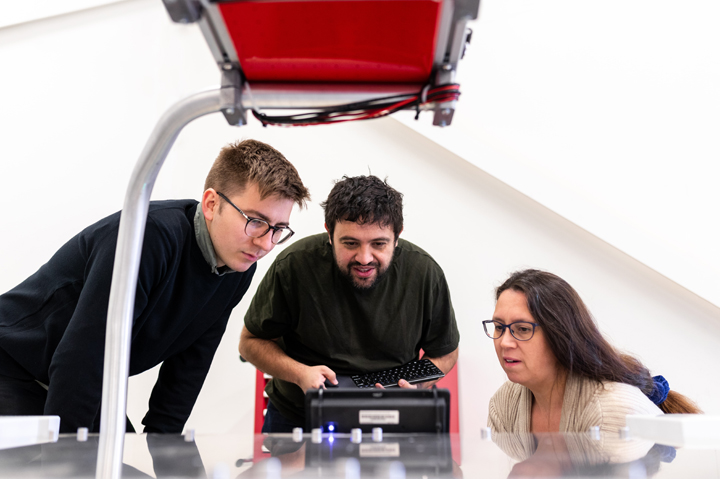- About us
- What we do
- Careers
- Investors
- Insights
- Client portal
5 Reasons Workplace Neurodiversity is Technology and Engineering’s Secret Weapon

Is boosting workplace diversity on your recruitment radar? If so, neglecting neurodiversity could be a big mistake.
However, neurodiversity is about more than just good corporate citizenship - it comes with a whole host of business-boosting benefits.
And in competitive markets like technology and engineering, neurodiversity could be the difference between scaling sustainably - and struggling to keep up.
But what is neurodiversity, and how exactly does your business stand to benefit from it? As part of our latest webinar series, we’ve tackled this topic head-on, demonstrating to STEM businesses what’s in store for them if they implement a neurodiverse recruiting process.
Read on to find out more.
What is workplace neurodiversity?
In today’s working world, there’s constant demand for candidates to be all-round performers. To be analytical and creative. To be process-driven and flexible to change. Left brain and right brain - all at the same time.
However, the most successful businesses are growing wise to the fact that different individuals naturally excel in different areas, and that’s where neurodiversity comes in.
Workplace neurodiversity is an approach that explores neurological conditions not as disabilities, but as natural variations of what is considered the human norm.
The most commonly recognised neurodivergent conditions are:
- Autism
- Dyslexia
- Dyspraxia
- ADHD
- Dyscalculia
As Steve Silberman, author of NeuroTribes, said, “honouring and nurturing neurodiversity is civilisation’s best chance to thrive in an uncertain future”, and businesses across the globe are starting to take notice of the benefits it holds.
Engineering or technology firm? Here are 5 reasons neurodiversity is your new secret weapon.
Keen to future proof your business and cement your position as a market leader? Neurodiversity will help you make it happen. Here’s 5 reasons it needs a firm place in your recruitment plan:
1. It’s an untapped market with huge potential
Engineering and technology is a competitive market. It’s candidate-led, and finding the right talent for the right projects can pose a real problem.
That’s where neurodivergent talent comes in. It’s relatively untapped as a talent pool, and that presents your business with immeasurable opportunity.
Struggling to fill a role? Open your recruitment process up to neurodivergent talent and reap the rewards.
Want to encourage neurodivergent applicants?
Your hiring process needs to change. Download our guide “Thinking Differently: Your 3-Step Roadmap to Promoting Workplace Neurodiversity” now.
2. It’s effective fuel for innovation
This is true for all types of workplace diversity, but neurodiversity gives this already potent competitive advantage even more of an edge.
By building a neurodiverse workplace, you encourage creativity and the pooling of different mindsets. These culminate into new ideas, fresh perspectives and enhanced innovation to drive your business forward.
3. Increased accuracy and error detection
Working on projects that require high attention to detail? Don’t overlook neurodivergent talent. Autistic individuals and professionals with ADHD are known to be hyper focused at tasks they’re passionate about.
With an engaging environment tailored to help them achieve their best, a neurodiverse team can quickly identify errors and improve accuracy in technical projects, saving your business time and money.
4. Your productivity will skyrocket
Neurodivergence is often seen as a disability that holds teams back, but this popular misconception couldn’t be further from the truth.
In fact, research shows that workplace neurodiversity is a powerful tool for promoting productivity.
As part of a trial into diversity and inclusion, Australia’s Department of Human Services hired 30 neurodivergent professionals into their testing team. After a preliminary period, they reported a 30% increase in productivity compared to their other teams.
5. Increased motivation and resilience
When the going gets tough, neurodiverse teams keep going, and there’s research to back it up.
By experiencing ADHD from a young age, individuals develop resilience to failure and an ability to find success in the face of daunting odds.
Coupled with this, those with dyspraxia are known to be determined, persistent, hard working and highly motivated.
By promoting workplace neurodiversity, you’ll build teams that press on in the face of pressure and see even the most challenging projects through to completion.
Webinar: Thinking Differently - Why Neurodiversity in Engineering & Tech is a Hidden Competitive Advantage
Get the full picture of neurodiversity in STEM, and gain actionable information on how you can open your recruitment process to neurodivergent talent. Watch the webinar free and on-demand now.
